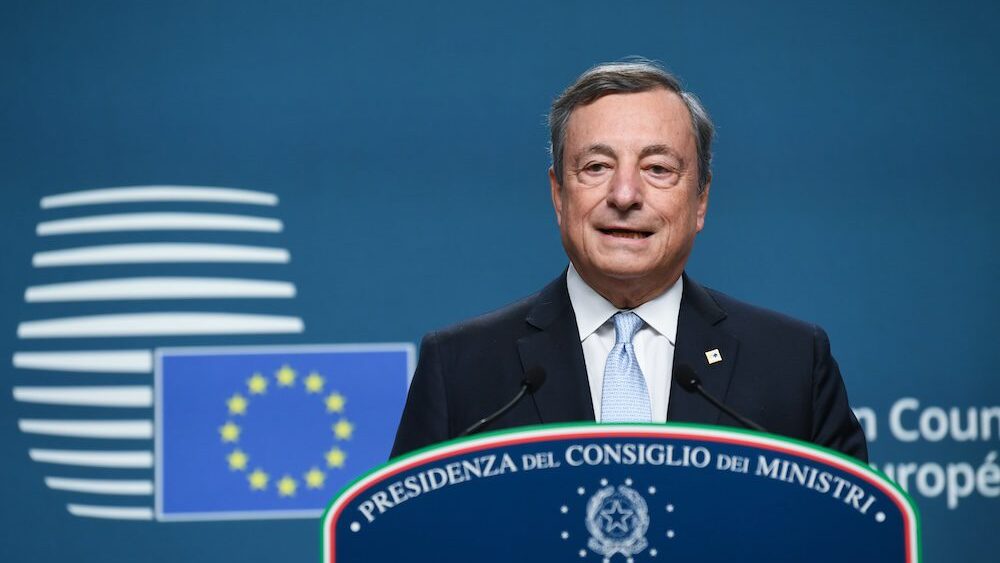
Former ECB President Mario Draghi.
Photo: © European Union
Brussels is set to unveil its long-awaited competitiveness report sometime this month, authored by former European Central Bank (ECB) chief Mario Draghi. Policymakers and business executives across Europe have eagerly awaited the document, expected to serve as the blueprint for the second Ursula von der Leyen Commission’s long-term economic vision, but delayed since before the EU election in June.
According to Politico, which has seen a draft, one of its main recommendations is a major overhaul of the EU’s defense investment rules—to foster industrial capabilities, military readiness, and cross-border cooperation—making Europe less dependent on U.S. arms sales and more secure to pursue its own strategic interests.
The draft document is dated June 20th but provides a general idea about what the final version will look like.
The ’Draghi report,’ as it’s commonly called, was commissioned by Commission President Ursula von der Leyen earlier this year to explain why Europe is seeing its productivity and competitiveness diminishing and to use this analysis to derive concrete and overarching policy implications.
The former ECB chief and Italian technocrat PM was chosen for the job because he was one of the few high-level policymakers in Brussels who is respected by the Right and Left alike and has demonstrated his competence in economic matters countless times.
Accordingly, the section dedicated to Europe’s defense industry begins by laying out the biggest challenges of the sector, including insufficient public spending, small domestic markets, lack of coordination on procurement, and dependence on international suppliers—primarily the United States.
These shortfalls, coupled with the geopolitical challenges posed by the war in Ukraine and the possible weakening of the U.S.’ defense umbrella over Europe under a second Trump presidency, clearly lay out the necessary course of action for the EU: we need to take our security into our own hands. In the draft report, Draghi argues,
With the return of war in the EU’s immediate neighborhood, the emergence of new types of hybrid threats, and a possible shift of geographic focus and the defense needs of the US, the EU will have to take growing responsibility for its own defense and security.
The question is—how are we to do that? For decades, European countries have stayed reliant on American security commitments, pouring little to no investments into their own manufacturing capabilities. “The EU’s defense industrial base is facing structural challenges in terms of capacity, know-how and technological edge,” Draghi says. “As a result, the EU is not keeping pace with its global competitors.”
The solution, according to the former ECB executive, is to slash red tape, incentivize long-term defense investment models, and foster cross-border cooperation. Most importantly, the report calls for overhauling the European Investment Bank’s (EIB) lending policies to cover defense investments under the EU’s sustainable finance frameworks and environmental, social, and governance (ESG) rules, freeing up significant previously unavailable funds for these industries.
Giving defense industries the ESG label would have been unthinkable a few years back, but the war in Ukraine changed a lot of perspectives, and now there’s a major push across the Western world to do just that. Global war is an existential threat, proponents of the change argue, which makes security a core element of the ‘sustainability’ of everything else.
“I call on the [European Union] to recognize the defense industry as a positive contribution to ‘social sustainability’ within the ESG taxonomy,” Hans Christoph Atzpodien, the CEO of the German Security and Defense Industry Association said just days after the Russian invasion began in 2022. With Draghi now calling for the same, the chance is that this will become a reality.
But as mentioned above, Draghi also recognizes that subsidizing defense industrial investments is not enough for small EU countries. The document, therefore, calls for allowing cross-border mergers “when increased scale would deliver efficiencies,” while also proposing the creation of a ‘Defense Industry Authority’ that would conduct arms procurements centrally on behalf of member states.
These are only recommendations, but the Commission will likely draw significantly from them as they fit perfectly together with already existing plans and programs, such as the European Defense Industrial Strategy (EDIS) and the European Defense Investment Program (EDIP).
These two initiatives are meant to form the backbone of the EU’s future military-industrial complex. The first aims to ramp up arms and ammunition production through defense industry subsidies, while the second addresses financial and legal aspects, with the goal of having at least 50% of the bloc’s arms procurements manufactured within EU member states by 2050.
All these efforts are seen as key for ramping up Europe’s defense capabilities, something that most countries and political parties agree on across ideological lines, though many warn of the slippery slope of becoming a defense union which may lead to the future establishment of an EU army. Still, when von der Leyen recently explained in her GLOBSEC speech that the goal is to establish the EU as a “security project,” she echoed almost word-by-word what Hungarian PM Viktor Orbán said a month earlier, during his famous Tusványos speech.
The only difference was that the conservative prime minister also pointed out that in order to establish an effective defense union, Brussels needed to “give up” being a political one, micromanaging countries in areas that should not fall under its competence, such as social policies and woke issues.
Furthermore, to fully realize the potentials of EDIS and EDIP, the EU would reportedly need a joint defense fund of €100 billion—something that would require another round of joint borrowing, which is perhaps the biggest obstacle facing the project. Orbán warned that EU countries won’t take on more debt without guarantees that they would benefit from the programs equally and that Brussels won’t suspend their participation for arbitrary ideological reasons, as happened with Poland and Hungary’s frozen pandemic relief funds.
